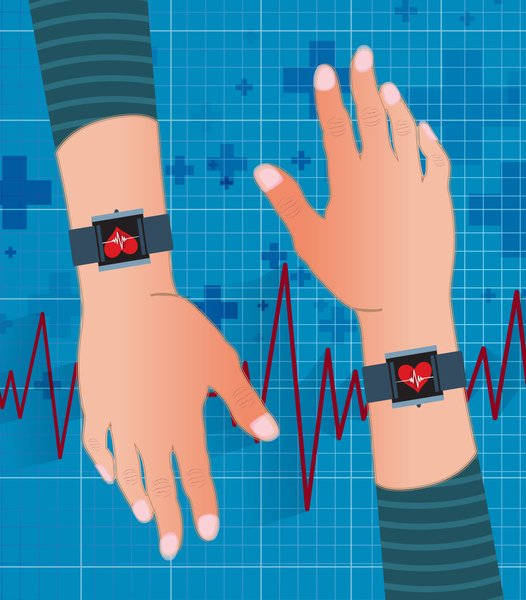
Wearable devices are viable options to monitor Covid-19 patients and predict symptom escalation for earlier intervention.
Image: Tammy Ko
A 60-person task force, including MIT Lincoln Laboratory researchers, has published a study reviewing mobile health (mHealth) technologies and examining their use in monitoring and mitigating the effects of the Covid-19 pandemic. They found that mHealth technologies are viable options to monitor Covid-19 patients and predict symptom escalation for earlier intervention.
The study, "Can mHealth Technology Help Mitigate the Effects of the COVID 19 Pandemic?", is published in the IEEE Open Journal of Engineering in Medicine and Biology. The task force was led by Harvard Medical School Associate Professor Paolo Bonato, director of the Motion Analysis Lab at Spaulding Rehabilitation Hospital in Boston, and included international experts and those from across the United States.
The study reviewed mHealth technologies in three categories - wearable sensors, digital contact tracing technology, and electronic patient-recorded outcomes screening systems. Task force subgroups then looked at how these technologies could be deployed in various settings and strategies in response to the pandemic.
Lincoln Laboratory biotechnology experts Jeffrey Palmer and Thomas Quatieri led a subgroup focused on wearable sensors for monitoring Covid-19 patients. Their goal was to identify sensors that are suitable to detect worsening symptoms in Covid-19 patients who are self-quarantining at home. Data show that a portion of these mildly symptomatic patients experience a sudden occurrence of severe symptoms at home and require hospitalization.
Monitoring these patients with wearable sensors for subtle changes, such as in body temperature, heart rate, and oxygen saturation, could allow clinicians to intervene sooner, improving clinical outcomes. These sensors could also help clinicians monitor patients once they return home.
"The high infection rates of SARS-CoV-2 put health care systems at risk of being overwhelmed with Covid-19 cases," says Palmer, who leads the laboratory's Human Health and Performance Systems Group. "Remote monitoring using mHealth technologies of those individuals who are at risk of, or have developed, Covid-19 may help alleviate some of the burden on the health-care system."
With Professor Sunghoon Ivan Lee and his team at the University of Massachusetts at Amherst, they also studied the viability of using wearable sensors to monitor the health of front-line clinical workers, and to detect early signs of an outbreak in hospital or health-care settings.
Together, they reviewed 28 commercially available wearable sensors that could be used immediately in clinical practices. Through an evaluation framework, they whittled their list down to 12 examples of technologies that could best be used today to monitor patients and health-care workers.
"Clinicians look at a certain set of indicators for Covid-19, so our goal was to see which products are best for monitoring people for those certain indicators, and that already have regulatory approval. We also considered how well these sensors could be used across certain groups and demographics, because we want this to help as many people as possible, and how they might be used together," Palmer says. "We didn't rank products because we are not endorsing one over the other; instead, we're providing examples of capabilities that could make a difference today."
Tanya Talkar at Lincoln Laboratory co-led another subgroup evaluating emerging technologies. "We aimed to focus on technologies which haven't yet been commercialized or fully validated in the mHealth space, or technologies which have found success in other sectors but have not yet been used in health monitoring," Talkar says.
Talkar's team focused on contactless sensing, vocal biomarkers, text-based mental health sensing, and robotic technologies. They identified several technologies that could apply to Covid-19 monitoring; although many of these technologies are still in a research state, Talkar says they have potential to be integrated into health-care environments in the future.
Quatieri, who leads the laboratory's vocal biomarker research related to Covid-19, says that one of the important outcomes of this study was "new and lasting collaborations with experts in a multitude of disciplines required in addressing a virus that has both physiological and neurological injury. For example, in the area of vocal biomarkers, presented as an emerging area in both mHealth studies that we co-led, we have formed new collaborations with the medical community that will provide essential data for our research in detecting and tracking Covid-19 through speech."
Bonato says that additional research will help expand the understanding of how best to use and develop the technologies. "The better data and tracking we can collect using mHealth technologies can help public health experts understand the scope and spread of this virus and, most importantly, hopefully help more people get the care they need earlier," he says.
This study was prompted by the Mass General Brigham Center for COVID Innovation, which was established to facilitate the development of new innovations that flatten the Covid-19 curve and protect front-line clinical staff.






